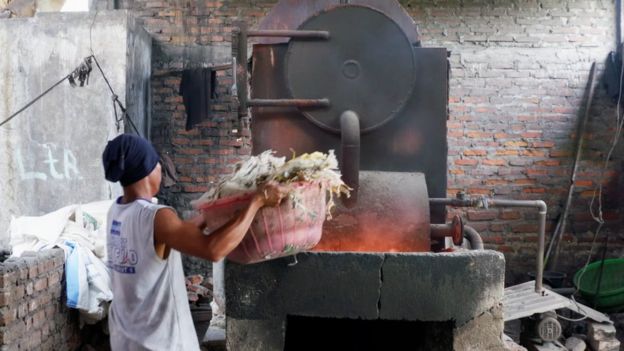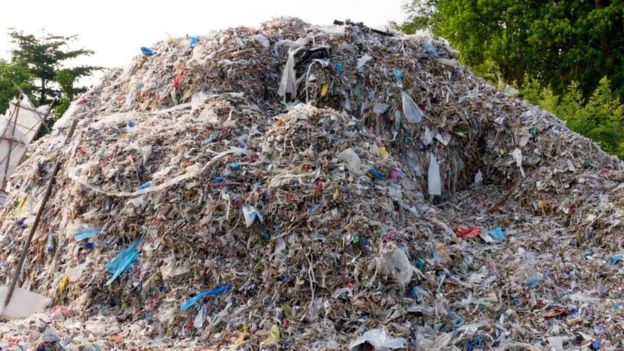The burning of plastic waste in Indonesia, much of which has been sent there by the West, is poisoning the food chain, the BBC has learned.
Environmental group IPEN found, in one East Java village, toxic dioxins in chicken eggs 70 times the level allowed by European safety standards.
Long-term exposure to the chemicals is linked to cancer, damage to the immune system and developmental issues.
Indonesia's government says it is sending the waste back to countries.
The BBC's Victoria Derbyshire programme also spoke to people with respiratory issues caused by the fumes from the burning of plastics, and filmed the open burning of plastics supposedly sent to Indonesia to be recycled.

At one tofu factory, plastic is burnt as fuel.
Researchers from IPEN (the International Pollutants Elimination Network) collected free-range chicken eggs at two sites near Surabaya, in East Java.
Testing eggs, the researchers said, was the easiest way to check whether the chemicals known as persistent organic pollutants (POPs) such as dioxins had made it into the food chain.
The most serious reading was taken near a group of tofu factories that burn plastics for fuel, in the village of Tropodo.
The tests found eating one egg would exceed the European Food Safety Authority (EFSA) tolerable daily intake for chlorinated dioxins 70 times over.
Researchers said this was the second-highest level of dioxins in eggs ever measured in Asia - only behind an area of Vietnam contaminated by the chemical weapon Agent Orange.
The eggs also contained toxic flame-retardant chemicals, SCCPs and PBDEs, used in plastics.
One resident in Tropodo said it was known as the "city of smoke".
"We don't need to tell the doctor what our symptoms are... we just tell them that we are from Tropodo and they know right away."
Experts believe eating a few contaminated eggs would not impact health - but long-term exposure could lead to serious problems.
"The results of our research are some of the most shocking we have ever had. In Indonesia, we've never had these results before," explained Yuyun Ismawati, a leading Indonesian environmentalist behind the tests.
Dr Agus Haryono, from the Indonesian Institute of Sciences, said the country's government needed to implement "a proper infrastructure for testing and monitoring POPs [Persistent Organic Pollutants]" to combat the "uncontrolled cross-border plastic trade".

In the first six months of this year, the UK sent 18,000 tonnes of plastic and 55,000 tonnes of paper to Indonesia
The researchers focused on the area around a paper factory in East Java, where around 40% of its paper is imported. But the paper is arriving contaminated with low quality plastic.
The plastic is then sold to local villagers, many of whom rely on the plastic for their livelihoods.
One so-called "plastic farmer" in the village of Bangun, Supiyati, told the BBC she made a living by searching through plastic waste to sell the better-quality material to plastic factories.
Continue reading this interesting BBC News article clicking here: Indonesia -plastics

No hay comentarios:
Publicar un comentario